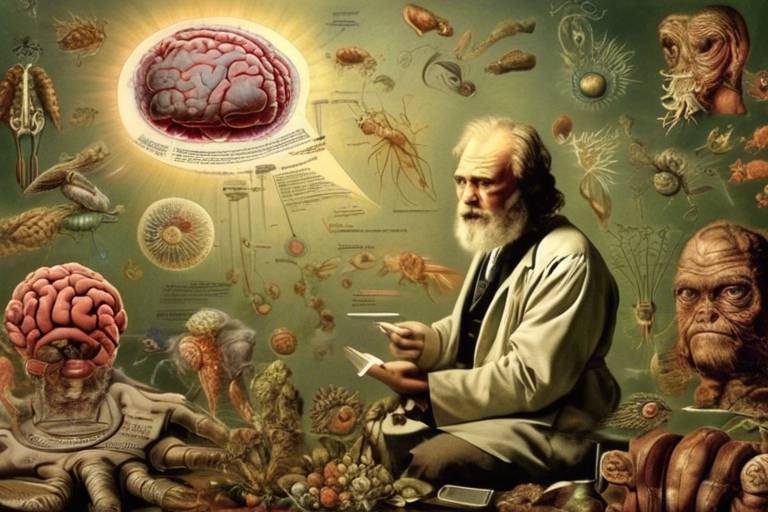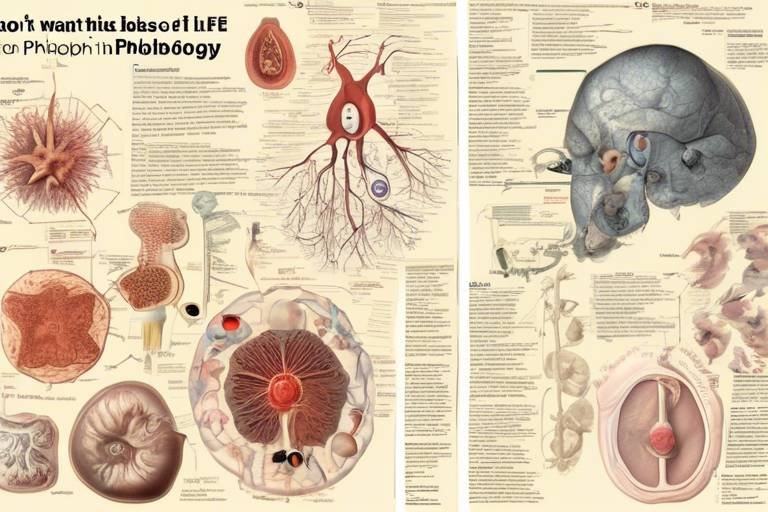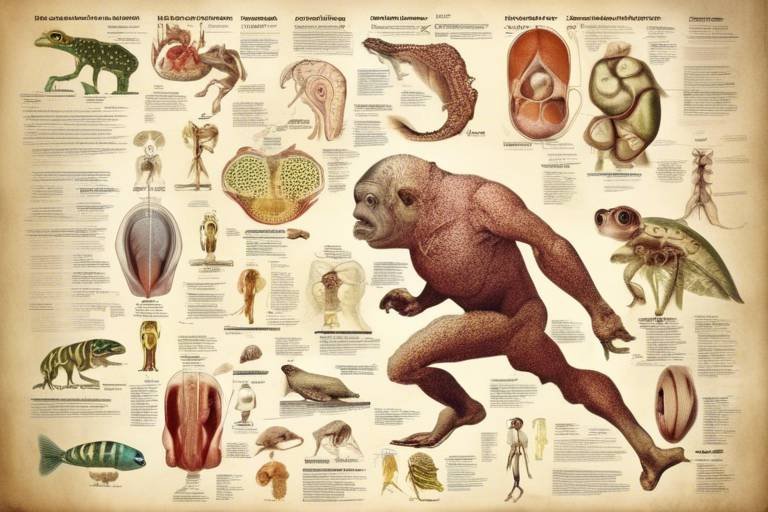The Role of Philosophy in Predictive Biology
In the ever-evolving landscape of biological sciences, the intersection of philosophy and predictive biology is a fascinating area of exploration. Philosophy serves as the backbone of scientific inquiry, providing the frameworks and principles that guide researchers in their quest to understand and predict biological phenomena. As we delve into this intricate relationship, it's crucial to recognize that predictive biology is not merely about crunching numbers and analyzing data; it is also about the philosophical underpinnings that shape our understanding of life itself.
Imagine predictive biology as a vast ocean of knowledge, where each wave represents a different biological phenomenon waiting to be understood. Philosophy acts as the lighthouse, illuminating the path for scientists navigating through this complex sea. It encourages us to ask profound questions: What do we truly know about biological systems? How can we be certain that our models accurately reflect reality? These questions are not only vital for scientific progress but also for ethical considerations in research and application.
As we explore the role of philosophy in predictive biology, we will uncover how different philosophical perspectives influence methodologies, shape ethical standards, and ultimately drive innovation in the field. From the foundational principles of epistemology to the ethical implications of predictive modeling, philosophy is intertwined with the scientific process, guiding researchers as they make predictions about the intricate web of life.
In the following sections, we will dissect the various components of this relationship, examining how philosophical frameworks influence the methodologies employed in predictive biology. We'll also highlight the significance of ethical considerations and the challenges that arise in the pursuit of knowledge. By the end of this exploration, you will gain a deeper appreciation for the critical role that philosophy plays in shaping the future of predictive biology.
- What is predictive biology? Predictive biology is a field that focuses on forecasting biological phenomena using data, models, and computational techniques.
- How does philosophy influence scientific inquiry? Philosophy provides the foundational principles that guide the scientific method, shaping how researchers formulate hypotheses, design experiments, and interpret data.
- What are the ethical implications of predictive biology? Ethical considerations in predictive biology address the potential impacts of research on ecosystems, human health, and societal norms, emphasizing the need for responsible scientific practices.
- What is the difference between reductionism and holism? Reductionism focuses on understanding complex systems by breaking them down into their individual components, while holism emphasizes the importance of studying systems as integrated wholes.

Understanding Predictive Biology
Predictive biology is an exciting and rapidly evolving field that focuses on the art and science of forecasting biological phenomena through the use of data and sophisticated models. Imagine being able to predict the future of ecosystems, disease outbreaks, or even the behavior of specific organisms based on current data—this is the essence of predictive biology. It merges the realms of biology, computer science, and statistics to create a framework that not only enhances our understanding of biological systems but also aids in decision-making processes across various sectors, including healthcare, agriculture, and environmental conservation.
At its core, predictive biology employs a variety of methodologies to analyze complex biological data. This can include statistical modeling, machine learning algorithms, and computational simulations. The significance of predictive biology cannot be overstated; it allows researchers to identify patterns within massive datasets, leading to insights that were previously unattainable. For instance, by utilizing genomic data, scientists can predict how certain genes will express in different environments, which can have profound implications for personalized medicine and genetic research.
The methodologies used in predictive biology are as diverse as the biological phenomena they aim to predict. Some common approaches include:
- Statistical Models: These models use historical data to identify trends and make forecasts.
- Machine Learning: Algorithms learn from data to improve predictions over time.
- Computational Simulations: These create virtual models of biological systems to test hypotheses and predict outcomes.
One of the most fascinating aspects of predictive biology is its ability to integrate data from various sources. For example, researchers might combine genomic data with environmental factors to predict how a species will adapt to climate change. This interdisciplinary approach not only enriches the predictive models but also fosters collaboration among scientists from different fields, leading to a more holistic understanding of biological processes.
In summary, predictive biology is a powerful tool that leverages data and models to forecast biological phenomena. It plays a crucial role in advancing our understanding of life and its complexities, while also paving the way for innovative solutions to pressing biological and environmental challenges. As we continue to refine our methodologies and integrate new technologies, the potential for predictive biology to impact our world is virtually limitless.

Philosophical Foundations of Science
Philosophy is the bedrock upon which the edifice of science is constructed. It provides the foundational principles that guide scientific inquiry, shaping how we formulate hypotheses, conduct experiments, and interpret data. In the realm of predictive biology, where the aim is to forecast biological phenomena, the influence of philosophical thought is particularly profound. It is through philosophy that we explore the nature of scientific reasoning, the criteria for evidence, and the ethical implications of our predictive models.
At the heart of this discussion is the understanding of how philosophical theories shape the scientific method. The scientific method itself is not merely a collection of steps; it is a manifestation of philosophical ideals about knowledge and truth. For instance, the principle of falsifiability, proposed by philosopher Karl Popper, emphasizes that for a theory to be scientific, it must be testable and refutable. This principle encourages scientists to design experiments that can disprove their hypotheses, thus fostering a culture of rigorous testing and validation.
Moreover, the interplay between philosophy and science can be seen in the development of various epistemological frameworks. These frameworks guide researchers in understanding what constitutes valid knowledge in predictive biology. For example, the distinction between qualitative and quantitative methods is rooted in philosophical debates about the nature of reality and how we can know it. Qualitative methods, which focus on understanding phenomena in context, contrast with quantitative methods that rely on numerical data and statistical analysis. Both approaches are vital, yet they stem from different philosophical understandings of what constitutes valid evidence.
To illustrate this further, consider the following table that summarizes key philosophical perspectives and their implications for scientific inquiry:
| Philosophical Perspective | Implication for Science |
|---|---|
| Empiricism | Knowledge comes from sensory experience; emphasizes observation and experimentation. |
| Rationalism | Knowledge is gained through reason and logical deduction; emphasizes theoretical frameworks. |
| Constructivism | Knowledge is constructed through social processes; emphasizes the role of context and interaction. |
As we delve deeper into predictive biology, we encounter numerous challenges in knowledge acquisition that further highlight the significance of philosophical inquiry. For instance, biases in data collection and interpretation can skew results, leading to inaccurate predictions. The philosophical foundations of science compel researchers to critically assess their methodologies, ensuring that they remain aware of their assumptions and limitations. This self-reflective practice is essential for maintaining the integrity of scientific research.
In conclusion, the philosophical foundations of science are not merely abstract concepts; they are vital to the practice of predictive biology. By understanding the philosophical underpinnings of scientific inquiry, researchers can enhance their methodologies, refine their approaches to data analysis, and ultimately improve the accuracy of their predictions. Philosophy serves as a compass, guiding scientists through the complexities of biological phenomena and ensuring that their work is grounded in a robust framework of knowledge.

Epistemology in Predictive Biology
When we dive into the realm of predictive biology, we quickly realize that it's not just about crunching numbers or running simulations. It's a complex dance of data, models, and, crucially, the knowledge that underpins them. This is where epistemology—the study of knowledge and justified belief—comes into play. In predictive biology, epistemology helps us determine what counts as valid data and how we can be sure that our models accurately represent biological phenomena.
At its core, epistemology in predictive biology raises some essential questions: What do we know about the biological systems we are modeling? How do we know that our predictions are reliable? These inquiries are not just academic; they have real-world implications. For instance, when scientists develop models to predict disease outbreaks, the accuracy of those models can significantly impact public health responses. If the underlying data is flawed or the model misrepresents the biological processes, the consequences could be dire.
To navigate these complexities, researchers often engage in a process of validation and verification of their models. This involves comparing model predictions with actual biological outcomes to assess their accuracy. However, this process is fraught with challenges. For instance, the availability of high-quality data is often limited, and biological systems are inherently complex and variable. As such, researchers must grapple with the following epistemological issues:
- Data Quality: Is the data we are using representative of the biological reality we wish to model?
- Model Assumptions: What assumptions are built into our models, and how do they affect our predictions?
- Interpretation of Results: How do we interpret the outcomes of our models, especially when they deviate from expected results?
These questions highlight the importance of a robust epistemological framework in predictive biology. It’s not enough to simply generate predictions; we must also critically assess the foundations upon which those predictions rest. This involves a continuous cycle of inquiry, where scientists must remain open to revising their models and assumptions in light of new evidence or insights.
Moreover, understanding the nature of scientific knowledge is crucial for establishing the criteria for what constitutes a valid predictive model. In predictive biology, models are often evaluated based on their predictive power and reliability. This means that a model that consistently makes accurate predictions across various scenarios is considered more robust than one that does not. However, the criteria for reliability can vary significantly depending on the context and the specific biological questions being addressed.
In conclusion, epistemology plays a vital role in shaping the practices and methodologies of predictive biology. By fostering a deeper understanding of knowledge, researchers can enhance the validity of their models, leading to more accurate predictions and ultimately better outcomes in biological research and applications. As we continue to explore the intricate relationships between data, models, and biological phenomena, the insights from epistemology will be invaluable in guiding us toward a more nuanced and effective approach to predictive biology.
- What is predictive biology? Predictive biology is a field that uses data and models to forecast biological phenomena, such as disease spread or ecological changes.
- Why is epistemology important in predictive biology? Epistemology helps researchers understand the validity of their data and models, ensuring that predictions are reliable and grounded in sound knowledge.
- How do researchers validate their predictive models? Researchers validate their models by comparing predictions with actual biological outcomes and revising their methods based on these comparisons.

The Nature of Scientific Knowledge
Understanding the nature of scientific knowledge is essential for grasping how predictions are made in the realm of biology. At its core, scientific knowledge is not just a collection of facts; it is a dynamic interplay of theories, observations, and empirical evidence that together form a coherent understanding of biological systems. Think of it as a vast tapestry, where each thread represents a different piece of information, woven together to create a comprehensive picture of life’s complexities.
One of the fundamental criteria for scientific validity is falsifiability. This principle, introduced by philosopher Karl Popper, asserts that for a theory to be considered scientific, it must be testable and capable of being proven false. In predictive biology, this means that models and hypotheses must be structured in a way that allows for rigorous testing against real-world data. If a model consistently fails to predict outcomes accurately, it requires revision or even abandonment, emphasizing the importance of adaptability in scientific inquiry.
Another critical aspect of scientific knowledge is reliability. This refers to the consistency of results obtained from experiments or observations. For example, if two different research teams use the same predictive model and arrive at vastly different conclusions, questions arise about the model's reliability. To enhance reliability, scientists often employ various methodologies, including statistical analyses and peer reviews, ensuring that their findings are robust and reproducible. A reliable model is akin to a well-tuned instrument; it must produce consistent results to be trusted.
Moreover, the nature of scientific knowledge also encompasses objectivity. In an ideal world, scientific inquiry would be free from personal biases and external influences. However, the reality is that human perspectives inevitably shape research directions. For instance, the choice of which biological phenomena to study or how to interpret data can be influenced by societal values, funding sources, and individual researchers' beliefs. This highlights the necessity for scientists to remain vigilant about their biases and strive for objectivity in their work.
In predictive biology, the interplay between theory and observation is crucial. Theories provide the framework for understanding biological processes, while observations offer the empirical evidence needed to validate or refute these theories. This cyclical relationship is essential for the advancement of knowledge. For example, a predictive model based on a theoretical framework can generate hypotheses that lead to new experiments, which in turn can refine or reshape the original theory.
In conclusion, the nature of scientific knowledge in predictive biology is multifaceted, involving criteria such as falsifiability, reliability, and objectivity. Each of these elements contributes to the ongoing quest for understanding the intricate patterns of life. As scientists navigate this complex landscape, they must remain adaptable, continuously questioning and refining their knowledge to keep pace with new discoveries and technological advancements.
- What is the importance of falsifiability in scientific research?
Falsifiability ensures that a theory can be tested and potentially disproven, which is essential for scientific progress. - How do reliability and validity differ in scientific studies?
Reliability refers to the consistency of results, while validity pertains to the accuracy of the findings in reflecting the true situation. - Why is objectivity crucial in scientific inquiry?
Objectivity minimizes biases, allowing for more accurate and trustworthy research outcomes.

Challenges in Knowledge Acquisition
The journey of acquiring knowledge in predictive biology is akin to navigating a winding river—filled with twists, turns, and unexpected obstacles. One of the primary challenges lies in the inherent complexity of biological systems. Unlike physical sciences, where laws can be consistently applied, biology is fraught with variability. Organisms are influenced by numerous factors, including genetics, environment, and interactions with other species. This variability can lead to significant difficulties when trying to model biological phenomena accurately.
Moreover, the quality of data plays a pivotal role in the reliability of predictive models. In predictive biology, researchers often rely on large datasets to inform their predictions. However, data can be riddled with biases and inaccuracies. For instance, sampling errors can occur if a dataset does not represent the entire population accurately, leading to skewed results. This concern is particularly pressing in fields like ecology, where the dynamics of populations can shift dramatically based on environmental changes.
Another challenge is the interpretation of models. Even when robust data is available, the models used to analyze this data can introduce their own set of biases. Researchers must be cautious about overfitting, where a model becomes too tailored to the specific dataset it was trained on, thus losing its predictive power when applied to new data. This is where the philosophical underpinnings of science become crucial, as they guide researchers in understanding the limitations and implications of their models.
Additionally, the rapid advancement of technology and methodologies can sometimes outpace our understanding of their implications. New techniques such as machine learning and artificial intelligence offer incredible potential for predictive biology, yet they also raise questions about data ethics and privacy. For instance, how do we ensure that the data used for predictions is ethically sourced and that the predictions made do not lead to harmful consequences? These ethical dilemmas are intertwined with the knowledge acquisition process, demanding a careful balance between innovation and responsibility.
In summary, the challenges in knowledge acquisition within predictive biology are multifaceted. From the complexity of biological variability to the nuances of data quality and ethical considerations, each obstacle requires thoughtful navigation. As we continue to explore the intersections of philosophy and science, understanding these challenges will be essential for advancing the field and making reliable predictions about biological phenomena.
- What is predictive biology? Predictive biology is a field that focuses on forecasting biological phenomena using data and models to understand and predict biological processes.
- Why is philosophy important in predictive biology? Philosophy provides foundational principles that shape scientific inquiry, influencing methodologies and ethical considerations in predictive biology.
- What are some common challenges in predictive biology? Challenges include the complexity of biological systems, data quality issues, model interpretation, and ethical dilemmas related to data usage.
- How can interdisciplinary approaches benefit predictive biology? Integrating insights from various fields can enhance predictive models, providing a more comprehensive understanding of biological systems.

Ethics in Predictive Biology
The field of predictive biology is not just about crunching numbers and analyzing data; it also brings forth a plethora of ethical considerations that researchers must navigate. As we delve deeper into the capabilities of forecasting biological phenomena, we must ask ourselves: what are the moral implications of our predictions? Are we prepared to handle the consequences of our findings? These questions are at the forefront of discussions surrounding predictive biology, highlighting the necessity for a robust ethical framework.
One of the primary ethical concerns in predictive biology is the potential for misuse of data. With the advent of advanced modeling techniques and vast datasets, the risk of manipulating results to fit a desired narrative becomes significant. For instance, if a predictive model suggests a particular outcome that aligns with a corporation's interests, there is a temptation to present that model as the definitive answer, regardless of its validity. This leads to a slippery slope where scientific integrity may be compromised for profit or personal gain.
Moreover, the implications of predictive biology extend beyond the laboratory. They can affect public health policies, environmental conservation efforts, and even agricultural practices. When predictions influence these areas, the stakes are incredibly high. For example, a predictive model that forecasts the spread of a disease could lead to premature public health interventions, which may cause panic or misallocation of resources. Therefore, researchers must ensure that their models are not only scientifically sound but also ethically responsible.
Another critical aspect is the informed consent of individuals whose data is being used. In many cases, predictive biology relies on extensive datasets that include personal information. It is essential to ensure that individuals understand how their data will be used and the potential outcomes of such usage. This is particularly relevant in medical research, where predictive models can lead to personalized treatment plans. The ethical principle of respect for persons mandates that we prioritize transparency and autonomy in our research practices.
Furthermore, we must consider the potential for bias in predictive models. If the data used to train these models is not representative of the broader population, the predictions may perpetuate existing inequalities. For instance, if a model predicting health outcomes is based primarily on data from a specific demographic group, it may not accurately reflect the realities faced by other groups. This raises ethical questions about fairness and justice in science, urging researchers to adopt a more inclusive approach when collecting and analyzing data.
To address these ethical challenges, many in the field advocate for the establishment of ethical guidelines and frameworks that can guide researchers in predictive biology. These guidelines should encompass principles such as transparency, accountability, and fairness. By fostering an environment of ethical awareness, researchers can better navigate the complexities of their work and contribute positively to society.
In summary, while predictive biology holds immense potential for advancing our understanding of biological systems, it is imperative that we approach this field with a strong ethical compass. By prioritizing ethical considerations, we can ensure that our scientific endeavors are not only innovative but also responsible and just.
- What are the main ethical concerns in predictive biology?
Ethical concerns include data misuse, informed consent, bias in models, and the societal implications of predictions. - How can researchers ensure ethical practices in predictive biology?
By adhering to ethical guidelines, prioritizing transparency, and ensuring inclusivity in data collection and analysis. - Why is informed consent important in predictive biology?
Informed consent ensures that individuals understand how their data will be used and the implications of that usage.

The Impact of Philosophy on Methodology
When we dive into the intricate world of predictive biology, it becomes evident that the methodologies employed are not merely technical choices but are deeply influenced by philosophical perspectives. Philosophy acts as an invisible hand, guiding researchers in their quest to understand and predict biological phenomena. It shapes the questions we ask, the methods we adopt, and the interpretations we draw from our data. Just like a compass directs a traveler, philosophy provides a framework that helps scientists navigate the complex landscape of biological research.
At the heart of this relationship lies the understanding that different philosophical approaches can lead to varying methodologies. For instance, a reductionist perspective, which focuses on breaking down complex systems into their simpler components, often leads to methodologies that emphasize quantitative analysis and controlled experimentation. In contrast, a holistic viewpoint encourages researchers to consider the entire biological system, promoting methodologies that may involve qualitative assessments and integrative approaches. This fundamental debate shapes how experiments are designed and how data is interpreted.
Moreover, the interplay between philosophy and methodology is not static; it evolves as new discoveries are made and as societal values shift. For example, the rise of interdisciplinary approaches in predictive biology reflects a philosophical shift towards collaboration across various scientific domains. This integration enriches the methodologies employed, allowing for a more comprehensive understanding of biological systems. By incorporating insights from fields such as ecology, computer science, and philosophy itself, researchers can develop more robust predictive models that account for the complexity of living organisms.
To illustrate this impact, consider the following table that summarizes how different philosophical perspectives influence methodological choices in predictive biology:
| Philosophical Perspective | Methodological Approach | Examples |
|---|---|---|
| Reductionism | Quantitative analysis, controlled experiments | Genetic sequencing, laboratory assays |
| Holism | Qualitative assessments, integrative studies | Ecological modeling, community studies |
| Interdisciplinary | Collaborative methodologies, mixed methods | Bioinformatics, systems biology |
This table not only highlights the diversity of approaches but also emphasizes the importance of philosophical considerations in shaping the methodologies used in predictive biology. Researchers must remain cognizant of these philosophical underpinnings, as they can profoundly affect the outcomes of their studies. For instance, a reductionist approach might yield precise data but could overlook essential interactions within biological systems. On the other hand, a holistic approach may capture these interactions but at the cost of precision.
In conclusion, the impact of philosophy on methodology in predictive biology cannot be overstated. It encourages researchers to reflect on their assumptions, challenges them to broaden their perspectives, and ultimately leads to a richer understanding of the biological world. As we continue to explore the complexities of life through predictive models, the philosophical frameworks we adopt will remain pivotal in guiding our scientific endeavors.
- What is predictive biology? Predictive biology is the field that focuses on forecasting biological phenomena using data and models.
- How does philosophy influence scientific methodology? Philosophy shapes the foundational principles and assumptions that guide the methods and approaches used in scientific research.
- Why is the reductionism vs. holism debate important? This debate impacts how biological systems are studied and understood, influencing experimental design and data interpretation.
- What role does interdisciplinary collaboration play in predictive biology? Interdisciplinary collaboration enriches predictive biology by integrating insights from various fields, enhancing the robustness of predictive models.

Reductionism vs. Holism
When diving into the intriguing world of predictive biology, one of the most captivating debates is that of reductionism versus holism. At first glance, these two concepts may seem like mere academic jargon, but they actually represent two fundamentally different ways of understanding biological systems. Reductionism breaks down complex systems into their simplest components, suggesting that by understanding each part, we can grasp the whole. Think of it as dissecting a car to understand how it works; by examining the engine, wheels, and electrical system individually, one hopes to understand the vehicle's overall functionality.
On the other hand, holism takes a step back and argues that the whole is greater than the sum of its parts. This perspective emphasizes the importance of context and relationships within biological systems. Imagine trying to understand a symphony by only listening to the individual instruments. While each instrument has its own role, the magic truly happens when they play together. In predictive biology, this means that understanding the interactions and relationships among various biological components is crucial for accurate predictions.
Both reductionism and holism have their merits and challenges. Reductionism allows for detailed analysis and precise predictions based on isolated factors, which can be incredibly useful in fields like genetics and molecular biology. However, it often overlooks the complexities and interactions that can lead to unexpected outcomes. Conversely, while holism provides a broader perspective, it can sometimes lead to vague conclusions without the support of detailed data. The real challenge lies in finding a balance between these two approaches.
In practice, predictive biology often benefits from a combination of both reductionist and holistic approaches. For example, researchers might use reductionist techniques to identify specific genetic markers for a disease, while also considering the broader ecological context in which these markers operate. This dual approach enables scientists to develop more accurate predictive models that can account for both individual components and their interactions.
To illustrate this interplay, consider the following table that summarizes the key differences between reductionism and holism:
| Aspect | Reductionism | Holism |
|---|---|---|
| Definition | Focuses on individual components | Focuses on the system as a whole |
| Approach | Analytical | Synthetic |
| Example | Studying a single gene | Examining an entire ecosystem |
| Strengths | Detailed insights, precision | Contextual understanding, integrative |
| Weaknesses | May overlook interactions | Can lack specificity |
As we continue to explore the fascinating intersection of philosophy and predictive biology, it becomes increasingly clear that both reductionism and holism are essential for a comprehensive understanding of biological phenomena. By embracing the strengths of both perspectives, researchers can develop predictive models that are not only accurate but also reflective of the complex realities of living systems.
- What is reductionism in biology? Reductionism is an approach that breaks down complex biological systems into their simplest components to understand how they function individually.
- What is holism in biology? Holism emphasizes understanding biological systems as integrated wholes, focusing on the relationships and interactions between components.
- How do reductionism and holism work together in predictive biology? A balanced approach that incorporates both reductionist and holistic perspectives allows for more accurate and comprehensive predictive models in biology.
- Why is it important to understand both perspectives? Understanding both reductionism and holism is crucial for addressing the complexities of biological systems and improving predictive accuracy.

Interdisciplinary Approaches
In the realm of predictive biology, the integration of various disciplines is not just beneficial; it is essential. When we think about biological systems, they are rarely isolated entities. Instead, they exist within a complex web of interactions that span multiple fields, including mathematics, computer science, environmental science, and even philosophy. By embracing an interdisciplinary approach, researchers can leverage diverse methodologies and perspectives, leading to a richer understanding of biological phenomena.
For instance, consider the intersection of biology and computer science. With the advent of big data, biologists are now equipped with vast amounts of information that can be analyzed using sophisticated algorithms. This collaboration allows for the development of predictive models that are not only more accurate but also capable of simulating complex biological processes. Imagine trying to predict the spread of a disease without the computational tools that can process large datasets—it's like trying to find a needle in a haystack without a magnet!
Moreover, the integration of philosophy into predictive biology encourages scientists to question the underlying assumptions of their models. Philosophical inquiry can illuminate the ethical implications of predictive modeling, guiding researchers to consider not just the 'how' but also the 'why' of their work. For example, when predicting the impact of climate change on biodiversity, it's crucial to ask what ethical responsibilities scientists have in communicating these predictions to policymakers and the public.
To illustrate the benefits of interdisciplinary approaches in predictive biology, here’s a table that summarizes key contributions from various fields:
| Field | Contribution |
|---|---|
| Mathematics | Development of statistical models for data analysis |
| Computer Science | Creation of algorithms for big data processing |
| Environmental Science | Insights into ecological interactions and impacts |
| Philosophy | Frameworks for ethical considerations and assumptions |
As we look towards the future of predictive biology, the importance of interdisciplinary collaboration cannot be overstated. By breaking down silos between disciplines, researchers can foster innovative solutions to complex biological questions. This synergy not only enhances the predictive power of biological models but also ensures that the implications of these predictions are thoroughly understood and ethically evaluated. So, the next time you ponder the mysteries of life, remember that the answers may lie at the crossroads of multiple disciplines, waiting to be discovered through collaborative effort.
- What is predictive biology? Predictive biology is a field that focuses on forecasting biological phenomena using data and models, often leveraging statistical and computational techniques.
- Why is interdisciplinary collaboration important in predictive biology? Interdisciplinary collaboration is crucial because biological systems are complex and interconnected, requiring insights and methodologies from various fields to enhance understanding and predictive capabilities.
- How does philosophy contribute to predictive biology? Philosophy provides frameworks for ethical considerations and helps clarify the assumptions underlying scientific models, guiding researchers in their inquiry and application of predictive biology.
Frequently Asked Questions
- What is predictive biology?
Predictive biology is a fascinating field that focuses on forecasting biological phenomena through the use of data and models. It aims to understand and predict how biological systems behave under various conditions, which can be incredibly useful in areas like medicine, ecology, and agriculture.
- How does philosophy influence predictive biology?
Philosophy plays a crucial role in shaping the foundational principles of scientific inquiry. It influences how researchers approach problems, design experiments, and interpret data. By providing a framework for understanding scientific methods, philosophical theories help guide the development of predictive biology.
- What is epistemology and why is it important in predictive biology?
Epistemology is the study of knowledge—how we know what we know. In predictive biology, it helps determine what constitutes valid data and models, ensuring that predictions are based on sound principles. Understanding epistemology is key to enhancing the reliability and validity of biological predictions.
- What are the ethical considerations in predictive biology?
Ethical considerations are paramount in predictive biology. Researchers must navigate the implications of their work, particularly when it comes to potential impacts on ecosystems, human health, and animal welfare. Ethical frameworks help guide responsible research practices and the application of predictive models.
- What is the difference between reductionism and holism in biological studies?
Reductionism focuses on breaking down complex biological systems into their individual components to understand them better, while holism emphasizes the importance of studying entire systems as integrated wholes. Both perspectives are relevant in predictive biology, influencing how researchers approach experiments and model biological phenomena.
- How do interdisciplinary approaches benefit predictive biology?
Interdisciplinary approaches enrich predictive biology by integrating insights from various fields such as mathematics, computer science, and ethics. This collaboration enhances the development of more robust predictive models and a deeper understanding of biological systems, leading to more accurate and meaningful predictions.



















